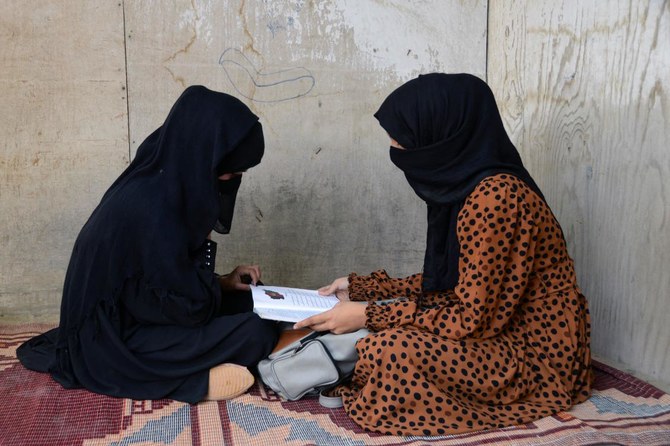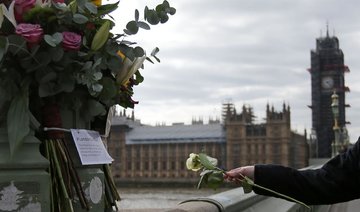KABUL, Afghanistan: A news presenter on Afghanistan’s TOLO TV wept as he read the announcement. Images of girls crying after being turned back from school flooded social media. Aid groups and many others remained baffled.
The Taliban have so far refused to explain their sudden decision to renege on the pledge to allow girls to go to school beyond sixth grade. Schools were supposed to reopen to older girls on Wednesday, the start of the new school year.
The ban caught even the Taliban-appointed Education Ministry unprepared. In many places across Afghanistan, some girls in higher grades returned to schools, only to be told to go home.
The move may have been designed to appease the Taliban’s hard-line base but it came at the expense of further alienating the international community, which has been reluctant to officially recognize Afghanistan’s new rulers, concerned the Taliban would impose similar harsh measures and restrictions — particularly limiting women’s rights to education and work — as when they previously ruled the country in the late 1990s.
The United Nations children’s agency told The Associated Press on Thursday they were blindsided by the announcement.
“I think that yesterday was a very confusing day for all of us,” said Jeannette Vogelaar, UNICEF’s chief of education in Afghanistan.
“We were blindsided,” said Sam Mort, UNICEF’s communications chief in Afghanistan. “All the messages, all the actions that had been taking place led us to believe that schools were opening, and as we understand it, that’s what our counterparts in the Ministry of Education believed as well.”
Ahead of the planned reopening, in remote and deeply conservative villages — where women teachers may not have been available to educate girls — arrangements were made for older male teachers, who were considered acceptable, to step in and teach all-girls classes beyond sixth grade.
Coincidentally or not, the Taliban leadership was summoned on Wednesday to southern Kandahar province amid rumors of a Cabinet shuffle, which was later denied. Still, reports have persisted of declining health of the elderly, Taliban-appointed Prime Minister Hasan Akhund, a hard-liner.
Since the Taliban seized power in mid-August during the last weeks of the chaotic withdrawal of US and NATO forces from Afghanistan, there have been reports of divisions among Taliban leaders, with lines drawn between the hard-liners and pragmatists.
It’s unclear whether a tussle among the Taliban on how to rule the country could have contributed to Wednesday’s ban but Torek Farhadi, an analyst who has advised past Afghan governments, called it a misfire.
“They really messed up by not keeping their word,” he said of the Taliban.
Afghanistan’s PenPath Volunteers, a group that works to promote education programs for all in rural areas, is planning to launch demonstrations against the Taliban ban, said Matiullah Wesa, the organization’s founder.
Started in 2009 by two brothers from the Taliban heartland of southern Kandahar, the organization has secret schools and thousands of volunteers distributing schools supplies across the country.
In Kabul on Wednesday, sisters Raihana Mirzakhail, 18, and Suria Mirzakhail, 17, showed up at their Mawlana Jalaluddin Mohammad Balkhi School. Their teacher started taking down attendance for the eleventh grade, when another teacher came into the classroom and told all the girls to go home.
“We were told this is not our school anymore,” said Suria. “We became so hopeless.” She and her sister had dreams to go to university.
“They broke our hearts ... we have nothing else to do at home,” Raihana said. “Other Islamic countries allow their boys and girls to be educated and that is why they are able to progress.”
On TOLO TV, announcer Sebghat Sepehr broke down Wednesday as he interviewed Soraya Paikin, a former deputy higher education minister, and rights activist Mahboba Siraj about the ban.
His voice broke, he started to cry and struggled to finish his question.
Many baffled by Taliban reneging pledge on girls’ education
https://arab.news/myack
Many baffled by Taliban reneging pledge on girls’ education

- The Taliban have so far refused to explain their sudden decision to renege on the pledge to allow girls to go to school beyond sixth grade
- Schools were supposed to reopen to older girls on Wednesday, the start of the new school year
India mosque survey sparks clashes, two dead

“Two persons were confirmed dead,” Pawan Kumar, a police officer in Sambhal in the northern state of Uttar Pradesh, told AFP, adding that 16 police officers were “seriously injured” during the clashes.
The Press Trust of India news agency quoted officials saying three people had died.
Hindu activist groups have laid claim to several mosques they say were built over Hindu temples during the Muslim Mughal empire centuries ago.
Street battles broke out when a team of surveyors entered the Shahi Jama Masjid in Sambhal on orders from a local court, after a petition from a Hindu priest claiming it was built on the site of a Hindu temple.
Protesters on Sunday hurled rocks at police, who fired tear gas canisters to clear the crowd.
Hindu nationalist activists were emboldened earlier this year when Prime Minister Narendra Modi inaugurated a grand new Hindu temple in the northern city of Ayodhya, built on grounds once home to the centuries-old Babri mosque.
That mosque was torn down in 1992 in a campaign spearheaded by members of Modi’s party, sparking sectarian riots that killed 2,000 people nationwide, most of them Muslims.
Some Hindu campaigners see an ideological patron in Modi.
Calls for India to more closely align the country’s officially secular political system with its majority Hindu faith have rapidly grown louder since Modi was swept to office in 2014, making the country’s roughly 210-million-strong Muslim minority increasingly anxious about their future.
Man in critical condition after stabbing on London’s Westminster Bridge

- Authorities have said that the incident is not being treated as terrorism-related
LONDON: A man is in critical condition after being stabbed during a reported fight on Westminster Bridge in central London, the Metropolitan Police confirmed on Sunday.
Emergency services, including the London Ambulance Service and an air ambulance, were called to the scene at about 10:45 UK time and an injured man was rushed to hospital for treatment.
A London London Ambulance Service spokesperson said: “We were called today (Sunday) at 10.46 a.m. to reports of an incident on Westminster Bridge, SW1.
“We sent a number of resources including ambulance crews, an advanced paramedic, an incident response officer and London’s air ambulance.
“We treated a man at the scene before taking him to hospital,” they added.
Three individuals have been arrested on suspicion of attempted murder, while a fourth has been detained for affray, the BBC reported.
Two of the arrested suspects sustained minor facial injuries and were also taken to hospital, according to police.
Authorities have said that the incident is not being treated as terrorism-related.
In March 2017, Briton Khalid Masood drove a car into pedestrians who were walking on the pavement along Westminster Bridge and Bridge Street, injuring more than 50 people, four of them fatally, before killing an unarmed police officer in the grounds of the Palace of Westminster.
He was then shot by an armed police officer, and died at the scene.
Bangladesh prepares to send trained nurses to Saudi Arabia in 2025

- Authorities are preparing to fulfill a Saudi request for 150 Bangladeshi nurses
- Migration of skilled Bangladeshi workers has been on the rise this year, government data shows
DHAKA: Bangladesh is preparing to send the first batch of trained nurses to Saudi Arabia by early next year, the country’s state-owned recruiting agency told Arab News on Sunday.
Bangladeshi nationals make up the largest group of expatriates in Saudi Arabia, with nearly 3 million working and residing in the Kingdom. But only a few dozen clinicians are among the group, according to Bangladesh Medical Association data.
In 2022, the two countries signed an agreement on the recruitment of health workers, targeting the large numbers of certified doctors, nurses and medics from Bangladesh’s more than 100 medical colleges.
Bangladeshi authorities are now preparing a batch of over 100 nurses to send to Saudi Arabia, said the Bangladesh Overseas Employment and Services Ltd., a recruitment agency under the Ministry of Expatriates’ Welfare and Overseas Employment.
“We got a request to send 150 nurses to the Kingdom … If everything goes alright, we can expect the first batch to (fly out) to the Kingdom early next year,” BOESL Executive Director Shawkat Ali said.
In Saudi Arabia, nurses must undergo the Saudi Prometric Exam in order to practice in the Kingdom. Though Bangladesh has many nursing school graduates, most do not have the required Prometric certifications, he added.
“Our nurses are very skilled and industrious … We have received huge queries for the nurses. But here they need to have the Prometric certification. If we can prepare them in line with the Saudi requirements, it will open new opportunities for our nurses.”
Only around 2 percent of Bangladeshi workers in the Kingdom are skilled professionals, but the number has been on the rise since the beginning of the year, according to data from the Bureau of Manpower, Employment and Training.
Though most Bangladeshi migrant workers are seeking employment in Saudi Arabia’s giga-projects under its Vision 2030 transformation plan, there has also been a growing demand for health workers from the South Asian nation.
“For our economy, exporting trained nurses to the Kingdom is a big opportunity. We are mostly an import-dependent country, so we need huge amounts of dollars to meet the import bills,” Ali said.
“If we can export a significant number of trained medical staffers, they would be able to send back more remittances.”
Ukraine shows fragments of new Russian missile after ‘Oreshnik’ strike

- Russia on Thursday carried out a strike on the city of Dnipro last week
- Use of IRBM in response to Ukraine’s firing US ATACMS and UK Storm Shadow missiles
Russia on Thursday carried out a strike on the city which President Vladimir Putin said was a test of its new Oreshnik hypersonic intermediate-range ballistic missile (IRBM).
Ukraine’s SBU security service displayed metal fragments, ranging from bulky to tiny, on fake grass in front of camouflage netting at an undisclosed location Sunday, AFP journalists saw.
The SBU did not name the missile used but said it was a type they had not seen before.
Oleg, one of its investigators, told journalists that “this is the first time the debris of such a missile has been found on the territory of Ukraine.
“This item had not been documented by security investigators before,” he added.
Oleg said that investigators are examining the fragments and will later “provide answers” on the characteristics of the missile.
He said that the missile was ballistic and had caused damage to civilian and “other infrastructure” in Dnipro.
In a televised address Thursday, Putin said Russia used the IRBM in response to Ukraine’s firing US ATACMS and UK Storm Shadow missiles into Russian territory, after the Kyiv allies lifted a ban on it using long-range weaponry to fire into Russia.
Putin said the missile flies at 10 times the speed of sound and cannot be intercepted by air defenses.
The president said it hit a defense industry production facility in Dnipro “which still produces missile equipment and other weapons.”
A Russian foreign ministry spokeswoman was heard answering a phone call about a strike on Yuzhmash during a press briefing. Yuzhmash is the Russian name of an aerospace manufacturer in Dnipro now called Pivdenmash.
Neither Kyiv nor Moscow has confirmed whether this was the target.
Putin has promised more combat testing of the Oreshnik missile and said it will go into serial production.
Ukrainian President Volodymyr Zelensky has called the strike “the latest bout of Russian madness” and appealed for updated air-defense systems to meet the new threat.
The head of Ukraine’s military intelligence has said Kyiv knew several prototypes of the missile had been produced before it was fired.
Indonesia’s Prabowo seeks UAE cooperation in industrialization efforts

- Indonesia’s new leader also visited Abu Dhabi in May as president-elect
- Indonesia, UAE signed new agreements covering energy, tech, healthcare
Jakarta: Indonesia’s new leader, President Prabowo Subianto, is seeking closer cooperation with the UAE on Jakarta’s industrialization efforts as he made his first official trip to Abu Dhabi since taking office last month.
Indonesia’s relations with the UAE grew under former President Joko Widodo, who in 2021 secured a more than $46 billion investment commitment from the Gulf state. The two countries signed a free trade deal a year later, which came into force last September.
The UAE was Prabowo’s last stop in his first foreign trip since becoming Indonesia’s new leader in October.
“Now that I have earned the trust from my people to lead Indonesia, I want to continue our good relations,” Prabowo told UAE President Sheikh Mohamed bin Zayed Al-Nahyan during their first official meeting in Abu Dhabi on Saturday.
Jakarta’s priorities are focused on defense, food security and energy security, he said, adding that the government also wants to implement a downstream policy that includes domestic processing of raw materials.
“This means we want to perform a massive industrialization,” Prabowo said. “In this context, we see that the UAE and Indonesia have similar priorities. We can work together across different sectors and we want to invite the UAE to actively participate in our economy.”
The two leaders also presided over the signing of several agreements as part of their meeting, covering areas such as technology, renewable energy, infrastructure and health.
“They agreed to increase trade between the two countries, specifically by optimizing the utilization of Indonesia-UAE CEPA,” Indonesian foreign ministry spokesperson Roy Soemirat told Arab News on Sunday.
“President Prabowo welcomed the UAE president’s invitation to strengthen cooperation in infrastructure and collaboration in international forums to resolve global issues, including peaceful conflict resolution.”
Prabowo’s visit to Abu Dhabi was his second this year, following a trip in May as president-elect.
He was concluding his first overseas trip as president, which also included stops in China, the US, and the UK.


















